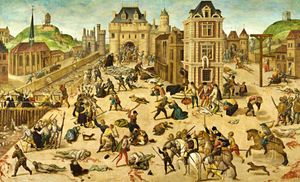This year is the 550th anniversary of a terrible event that marked early European history. It is often thought that the St Bartholomew’s Day massacre of French Huguenots was something that took place in Paris on one day. That is not the case; there were nationwide massacres. They determined the future of Protestantism in France until the Revolution and indirectly also the future of Europe. Moreover, they gave rise to Protestant resistance theory, which contributed to developing ideas of justice and resistance to tyranny.
A shocking event
Outcomes
The Reformed faith was numerically reduced as the Huguenots chose one of three options. Getting out of France to Geneva or elsewhere, fleeing to a city of refuge – La Rochelle, Nîmes, Montauban, Sedan – or recanting, which sadly a surprising number did.
This weakened France economically, but also socially, as it removed effective opposition to the tyrannical Bourbon monarchs, four of whom ruled until the Revolution. It has been suggested that without this tragedy there would possibly be around 30 million Protestants in France today.
To make things worse, the massacre, which followed the first three wars of religion, provoked five more before the Edict of Nantes established an uneasy compromise in 1598. More than just wars of religion, this civil conflict was a struggle for royal power between the Catholic and Protestant nobility.
A flood of pamphlets
The major immediate push-back came in a flood of pamphlets inspired by a group of French jurists called the monarchomaques (“king fighters”) who were led by Calvin’s adjudant, Theodore Beza. He wrote a treatise, influenced by John Knox, entitled The Rights of Rulers, considered too hot by the leaders in Geneva to publish there.
His argument was that rights involve duties, because if a people can exist without a king, a king cannot without a people. However, what Beza wrote was the opposite of what the title suggests – he argued for the rights of citizens and the duties of their rulers. This is what made it explosive.
Democracy according to Beza
Beza had four lines of attack: rulers exist by election and the consent of their people; royal authority is conditional, a legal bond binding sovereign and people; when this covenant is broken a king may be removed; the king is a servant to his kingdom. If trust is violated, royal right is forfeited. This may seem small beer today, but at the time it was dynamite.
These four points are undergirded by the biblical notion of covenant. For Beza, the covenant is founded on God’s creation law and its structures, and repeated in the Mosaic covenant and the ten commandments. For the ‘chaplain of the Huguenots’, covenant-breaking by the monarch is a form of idolatry. Tyrants break covenant by serving power, not the rights of citizens. Tyranny is the slavery of the people. It can be legitimately opposed by their representatives. Unjust rulers can be deposed.
This idea that tyranny is idolatrous is not a speculation. It is borne out by the history of the modern world in which ideologies are masks that hide idolatry. They empower human rulers without accountability to anyone.
Fast forward to the present
Christians in the West today have become a minority as the Huguenots were. Since the start of the century we have begun to feel the heat of new ideologies of idolatry. Christians have been gaslighted into thinking that their ruling superiors are some kind of benevolent neutrals. They aren’t any more.
Governments, political parties, the civil service, legal systems, multi-national corporations, the BBC and the media, are all promoting agendas that are opposed to biblical truth. Institutionally they play fast and loose with God’s law, both natural and revealed, and celebrate every form of deviance imaginable. God’s values are anathema to their new codes of secular righteousness. The major churches have surprisingly become “useful idiots” in everything from gender to face masks.
Could it be that Beza had a point? Are not those who rule over us idolatrous covenant-breakers? Why should we kowtow to these blind leaders of the blind? As disciples of Christ are we not called to ‘obey God rather than man’? Is it not time to wake up as protestants and be critically dissident from the spirit of the age?
This article echoes a lecture given by Paul Wells at the Westminster Ministers Conference in December 2021 on the Huguenots and taking up arms, to be published in the Spring with the other lectures given.
Paul Wells, editor in chief of Unio cum Christo (uniocc.com).




